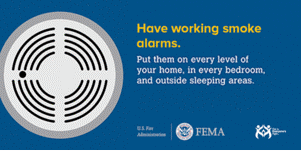Fall Back: Turn and Test
Published Date: Nov 01
Daylight saving time ends Sunday, Nov. 5. When turning your clock back one hour, make sure your smoke and carbon monoxide alarms are working, and check that the batteries have plenty of charge. It is also a great time to check the expiration dates of your emergency supplies.
A smoke alarm with a dead or missing battery can be the same as having no smoke alarm at all.
Read more
A smoke alarm with a dead or missing battery can be the same as having no smoke alarm at all.
Read more
How well do flu vaccines work?
Published Date: Oct 31
Studies by CDC researchers and other experts indicate that flu vaccine reduces the risk of doctor visits due to flu by approximately 40% to 60% among the overall population when the vaccine viruses are like the ones spreading in the community. Other studies have shown similar protection against flu-related hospitalizations.
A flu vaccination does not guarantee protection against the flu. Some people who get vaccinated might still get sick. However, people who get a flu vaccine are less likely to get sick with flu or hospitalized from flu than someone who does not get vaccinated.
The most important factors that affect how well the flu vaccine works include:
A flu vaccination does not guarantee protection against the flu. Some people who get vaccinated might still get sick. However, people who get a flu vaccine are less likely to get sick with flu or hospitalized from flu than someone who does not get vaccinated.
The most important factors that affect how well the flu vaccine works include:
- The “match” between the flu vaccine and the flu viruses that are spreading that season; and
- Factors such as the age and overall health of the person being vaccinated. For example, older people with weaker immune systems may respond less well to vaccination.
Halloween Safety
Published Date: Oct 27
While planning your Halloween activities and choosing costumes for your children, keep in mind some safety tips to avoid injury.
According to the National Safe Kids Campaign, children are twice as likely to be hit by a car and killed on Halloween than any other day of the year. There is also an increase in burns and falls during Halloween activities. Make note of the Safe Kids Halloween Safety tips.
To avoid falls from cumbersome costumes, dangerous treats, and risky activity on Halloween night, the Alabama Department of Public Health recommends parents and children follow these safety tips.
According to the National Safe Kids Campaign, children are twice as likely to be hit by a car and killed on Halloween than any other day of the year. There is also an increase in burns and falls during Halloween activities. Make note of the Safe Kids Halloween Safety tips.
To avoid falls from cumbersome costumes, dangerous treats, and risky activity on Halloween night, the Alabama Department of Public Health recommends parents and children follow these safety tips.

